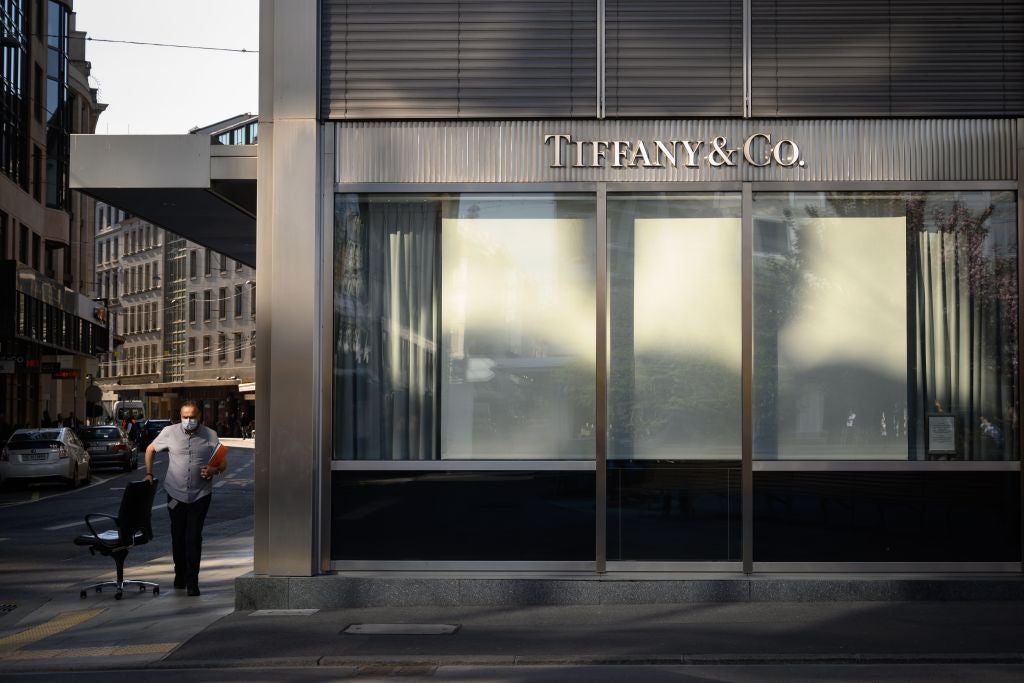LVMH have bought Tiffany, how they can justify $16bn now I don’t know
The only explanation is that LVMH were trapped in the deal, how else can they justify forking out on a luxury jewellery company while the rest of us fight against a pandemic, asks Chris Blackhurst


Board meetings of Tiffany, the US jeweller, are extremely private affairs, which is a pity because this week I would have loved to have seen the smiles on the directors’ faces as they agreed to accept the revised offer from LVMH, the French luxury goods group, of $15.8bn (£12.2bn) for their company.
Just writing that figure makes me shake my head in disbelief and throws me back to a bygone age, the one before Covid-19, when looney money was being chucked around, especially for high-end designer clothes and accessories. Seeing the announcement struck a jarring note – exactly the same as the one from the news that Kim Kardashian was spending a reported $1m on holding her 40th birthday party for family and close friends on Marlon Brando’s private island in Tahiti. It was completely wrong, tone deaf, utterly out of touch with the times in which we’re living – and how we’re viewing the world and will continue to view the world once the pandemic is ended.
LVMH had been doing their level best to scupper the agreement struck a year ago in that halcyon, some might say insane, era. Then, Bernard Arnault, the billionaire chair and chief executive of the company behind brands such as Louis Vuitton and Christian Dior, said he would pay $135 a share for Tiffany. The new price is the equivalent of $131.50, a reduction of $425m off the total or a mere 3 per cent.
This, after Arnault had seemingly pulled out completely in September, a move that was reinforced by complaints that Tiffany’s performance due to the coronavirus outbreak was “catastrophic” and its future prospects were “dismal”. Tiffany’s value, it was maintained by LVMH’s lawyers, was fundamentally weakened, in effect it was no longer the same company so the marriage was off.
Tiffany hit back, with a lawsuit requiring LVMH to complete on the original terms. The battle seemed like something out of fantasy – a dispute over $16bn for a jewellery business when the rest of the globe was battling a virus and economic misery. It was the sort of figure that would have been more appropriately spent on the hunt for a vaccine or on poverty relief, not on a glitzy accessories brand.
Oh, to have been a witness to the LVMH public relations’ team finalising a statement from Arnault that: “We are as convinced as ever of the formidable potential of the Tiffany brand and believe that LVMH is the right home for Tiffany and its employees during this exciting next chapter.”
The Frenchman has a reputation for getting what he wants, and this was the interpretation in some quarters, presumably encouraged by his spin doctors. It was a measure of Arnault’s desire to own Tiffany that he did not really want to abandon the takeover, despite the abuse and sanctioning the legal thrust and counter-thrust. It was just Bernard adopting a tactic, apparently, to get the bill down – he was never really prepared to let Tiffany go.
That would be believable if the reduction was substantial, but 3 per cent is neither here nor there, not when the final cost is $15.8bn. No, either Arnault has lost his touch completely or, as push was heading for shove in the Delaware court, his lawyers concluded there was no way out – LVMH was stuck and was bound to honour the deal.
Of the two bosses’ reactions, the one from Tiffany chair Roger Farah appeared closer to the mark when he said, possibly with a degree of understatement, that the board of directors concluded the compromise was in the “best interests of all of our stakeholders to achieve certainty of closing. We are very pleased to have reached an agreement with LVMH at an attractive price and to now be able to proceed with the merger.”
The new terms still have to be approved by Tiffany shareholders, which is unlikely to be a problem so deliriously happy are they likely to be. The closing is now expected early next year.
By then we will be still be in the clutches of Covid-19, and the luxury goods market will appear just as much an irrelevance as now. Aviation may have recovered slightly, but not to anything like the volumes enjoyed in the recent past. Those smart outlets in the airports will be maintaining a desolate air for quite some time – if, that is, they ever recover at all all. I suspect the crisis has brought a correction, that a society that was going mad for anybody resembling a celebrity and anything that came with a huge price tag attached will be much more circumspect.
This, as well, is the figure LVMH is paying – how they’re going to achieve the level of growth in the years ahead to justify such an outlay is hard to fathom.
Arnault and his minions may prove me wrong, of course. After all, they’re geniuses at making people pay over-the-top money for their wares. For once, though, I can’t help thinking they’re the ones taking the item home, wondering why they paid so much and dreading the sight of the credit card bill.
Join our commenting forum
Join thought-provoking conversations, follow other Independent readers and see their replies
Comments


Bookmark popover
Removed from bookmarks